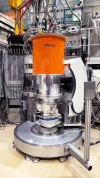Professor Yaochu Jin is conducting research into nature-inspired artificial intelligence at Bielefeld University, in an attempt to develop AI capabilities.
Researchers have long investigated how artificial intelligence (AI) can draw on principles from nature to solve complex problems. When it comes to identifying patterns in large amounts of data, AI is faster and more capable than humans. However, AI has difficulties when it is required to make connections or deal with uncertainties.
Through evolution, development, and learning, nature has developed more practical problem-solving solutions. Artificial Intelligence professor, Yaochu Jin, at Bielefeld University (BU) is researching how such principles can be transferred to AI.
Professor Jin will be continuing with his previous research on nature-inspired artificial intelligence at BU and looking for applications of a nature-inspired and self-organised AI. “My goal is to understand and borrow successful mechanisms from nature and transfer them into artificial intelligence for problem-solving,” explained Jin. The Alexander von Humboldt Foundation is supporting Yaochu Jin’s research with prize funds amounting to 3.5 million euros over a period of five years.
AI improvement research developments
Jin is currently setting up his research laboratory at the Faculty of Technology and assembling his research team to study nature-inspired AI. Having a team with an interdisciplinary orientation is particularly important as it enables him to bring together approaches from different disciplines such as computer science, biology, and medicine.
He also emphasises the requirement for international cooperation in his research. For example, he is looking forward to research visits from international scientists, such as former students from China, and researchers from the University of Surrey, where he worked before moving to Bielefeld. “I want to do something that is currently not the main approach to artificial intelligence, and I want to find out more about possible applications that have yet to be explored sufficiently,” explained Jin.
Enabling technical systems to self-organise
“AI is designed to work very precisely,” explains Jin. “But when uncertainty comes into play or things are not completely clear, it gets into difficulties.” In addition, AI usually focuses and foregrounds one specific question or task at a time. Using it can become a challenge when it has to organise itself in order to make connections, or find a solution to a task that is not well defined.
Nature, on the other hand, is perfectly capable of dealing with various degrees of uncertainty. “When we are born, our basic equipment can draw on millions of years of evolution,” stated Jin. For example, the structure of the brain has long been tried and tested in nature. Our brain is neuroplastic and capable of constantly rewiring itself, therefore it can adapt. When you learn a foreign language or play a new sport, for example, your brain changes accordingly. “You can also see this if you let twin cats grow up in different environments. You’ll find differences in their neural systems, even though their genetic makeup is practically identical,” added Jin.
Artificial intelligence that works according to the principles of nature
As nature is capable of reacting and adapting flexibly to the greatest variety of problems and requirements, Jin is therefore looking at how to orient AI in a way that mimics these basic principles of nature, thus making it significantly more flexible. He has done pioneering work in the field of nature-inspired optimisation and self-organisation and will continue to work on evolutionary and developmental systems in Bielefeld.
At Bielefeld University, Jin will devote himself to understanding and simulating intelligence in nature, with a focus on the co-evolution and development of neural systems and body plans.
Utilising secure and privacy-preserving evolutionary learning for healthcare
Jin’s future research will also focus particularly on the application of a privacy-preserving AI to healthcare. “My main concern at the moment is how to make use of data while effectively protecting its privacy and security,” he said. “Especially in healthcare, data is very sensitive and needs to be as secure as possible.” That’s why this requires not only adaptive but also particularly robust systems that can withstand attacks from outside.
Additionally, Jin would like to use AI to conduct research to better understand the genetic mechanisms at work in underlying heart failure. “I would like to be able to determine which genes are involved and which interactions between genes increase the risk of heart problems,’ Jin expressed.









